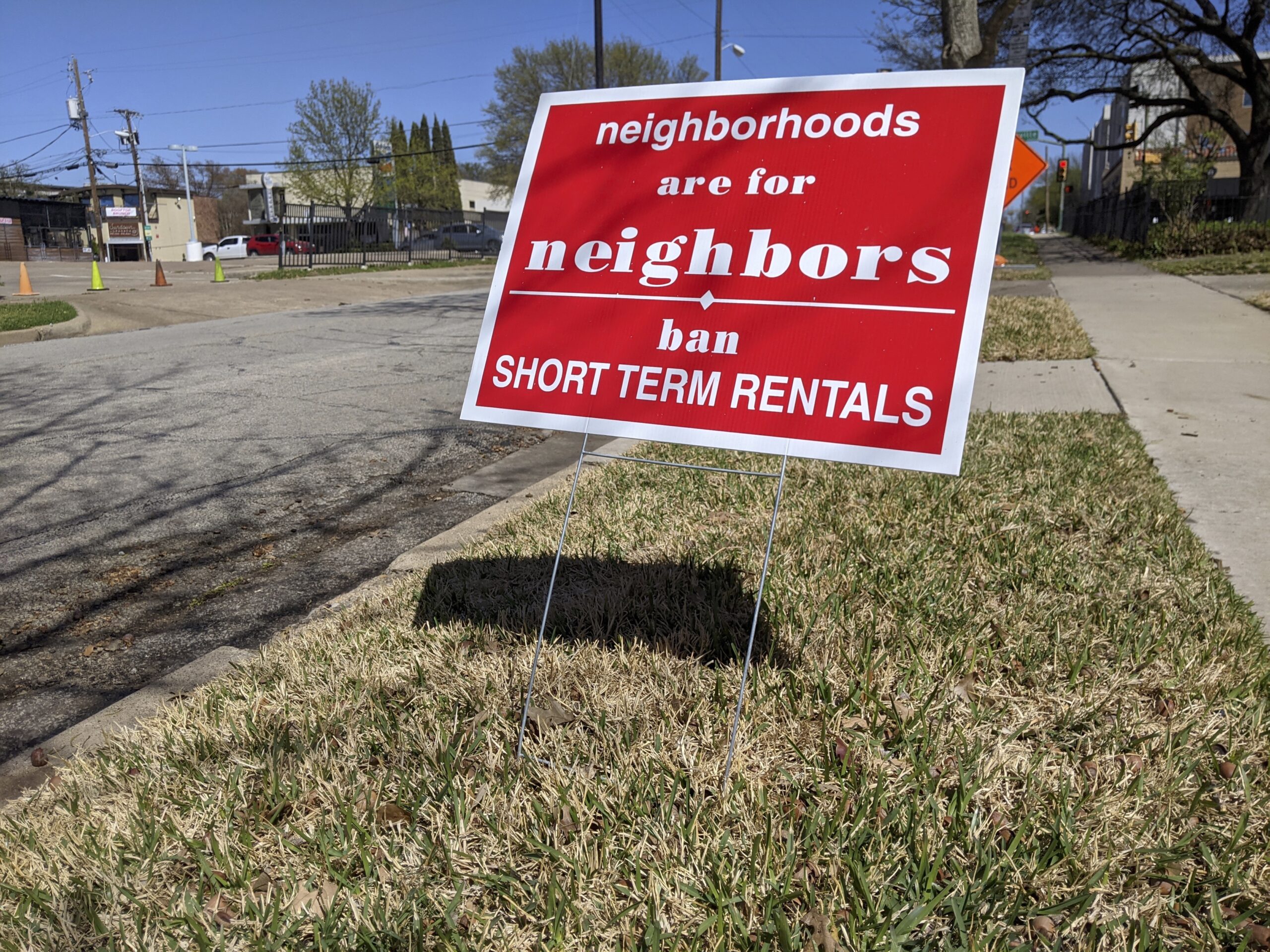Ask around—or just tune into your neighborhood’s most active social media channel—and you’ll hear the horror stories. Corporate retreats and days-long shindigs spilling into the streets of residential neighborhoods. Labor Day ragers with bottle service and a $30 cover.
“We had a party bus in our street last week and the weekend before that,” says Kristen Doe, who lives in northeast Dallas and is behind the website nomoredallaspartyhouses.com. “A party bus, coming down the street with a disco ball and music,” waking up her kids and the neighbors in her cul-de-sac.
It has been more than three years since Doe says she first complained to the city about her neighborhood’s party house—a short-term rental that was listed on services like Airbnb (which has since removed the listing) and Vrbo at $995 a night. And it has been more than a year since the city formed a task force to study new regulations of short-term rentals. Now, at least one council member on that task force is showing an appetite for a set of regulations and zoning changes “with teeth,” including a possible ban on short-term rentals in single-family residential neighborhoods.
In Dallas, any new policy would be built from a mostly blank slate. Noise ordinances and code enforcement can be cited to crack down on rowdy parties at short-term rentals after the fact. But the city doesn’t have much of anything on the books regulating properties that are rented for 31 days or less, which is what is usually meant by “short-term.” Unlike other rental properties, short-term rentals don’t have to be registered with the city’s rental home registration program, meaning they’re not subject to inspection.
Operators are supposed to register for and pay hotel occupancy taxes, but most of them haven’t bothered. According to city data, as of December there were 2,161 short-term rental properties in Dallas. More than 1,400 of them had yet to register for the hotel tax. Opponents of short-term rentals think that drastically undercounts the real number of short-term rentals in Dallas: Inside Airbnb, a website tracking data on listings around the world, found more than 4,100 Airbnb listings in the city as of February.
Councilman David Blewett was a member of the task force that spent the last year studying the issue, which he says has grown worse during the COVID-19 pandemic. With ballrooms and other gathering spaces closed, the parties haven’t stopped; they’ve just gone residential. His District 14, covering parts of downtown, Uptown, and East Dallas, has more short-term rentals than any council district in the city. He says residents in his district, in Old East Dallas and Munger Place and elsewhere, are scared.
“One party house can ruin a block,” says Blewett. “Every time you see a house get sold and you don’t know who the neighbors are, we’re all on eggshells. Any given house could wind up being one of these problems. And then every weekend you can’t sleep, and every weekend you’ve got cars all up and down your street, and you’re worried about your kids walking around.”
Members of the Dallas City Council’s Quality of Life committee were briefed this week on options to regulate short-term rentals, ranging from a requirement to register with the city to zoning changes that would ban them in certain places. The properties could, for example, be allowed to operate in entertainment districts or mixed-use areas, but not in single-family neighborhoods. Blewett, who is running for re-election in May, says he favors a mixed approach, but that he would ultimately support banning short-term rentals in single-family neighborhoods. “It’s a critical problem for the single-family neighborhoods,” he says. “If we don’t get it right, if it’s just a regulatory scheme but without teeth, it’s not going to change anything.”
Recent years have seen crackdowns on short-term rentals in cities across the country, including Austin. There, an especially aggressive policy limits how many people can stay at a short-term rental, prevents the properties from being used after 10 p.m. for group events like weddings and bachelor parties, and would eventually ban non-owner-occupied rentals from residential areas. Aspects of Austin’s policy have been challenged in court, and legal threats from the owners of short-term rentals have been a part of the heated debate that has ensued in most cities that have weighed banning them.
Arlington in 2019 banned short-term rentals throughout most of the city, allowing them only in an area near the entertainment district encompassing AT&T Stadium, the ballparks, and amusement parks. David Schwarte, a retired attorney, helped found the Texas Neighborhood Coalition to push for the ban in Arlington. “If you’ve never lived next to [a party house], you may not care,” he says. “If you’ve got one close to you, you immediately become a foe.” But the effects of a party house are felt beyond its immediate neighborhood. Opponents of short-term rentals have also blamed such properties for, among other things, contributing to a housing shortage, driving up housing costs, and siphoning taxable money from hotels.
Schwarte’s neighborhood, not far from Arlington’s entertainment district, was once “overrun by these mini-hotels” throwing loud parties, he says. Then the ordinance went into effect. “It worked,” he says. “That cleaned up our neighborhood. Places that were short-term rentals have now been sold to families or are long-term rentals.”
Shelby Fletcher, who manages short-term rentals in Dallas and is the co-president of the Dallas Short-Term Rental Alliance, touts what she says are the economic benefits of short-term rentals. “Short-term rentals have brought a lot of jobs to our cities,” she says. “There are people like me who have it as their primary or supplementary income. You also have cleaning and maintenance people, plus other service providers who are employed because of this short-term rental ecosystem.”
Out-of-control party houses are the exception, and far from the rule, she says. “The people who are [renting] are generally families, business travelers, a lot of people coming into town for surgery.” Others are considering a move and trying out new cities, particularly during the pandemic, she says. Fletcher manages properties on behalf of their owners, but most short-term rentals are owner-operated, she says. And most are good neighbors. “We don’t like bad operators and we are not trying to protect them. They give us all a bad name. We want them gone.”
Fletcher says her organization opposes zoning changes and a broad ban on short-term rentals, and instead favors a registration process along with a three-strikes provision to punish “bad actors.” It would be a policy with “some teeth,” she says, although perhaps a little more gummy than opponents would like. “Short-term rentals are by and large operated by respected, interested community members. The vast majority of us are great neighbors. We are the house on the block that has landscaping. We’re incentivized to take care of our property.”
Any new regulations will only come with a fight, and not a short one. City staffers told council members this week that developing new rules, particularly zoning changes, would take at least months, and possibly up to a year. A virtual public hearing is being set for next month.
Doe, who watched a party bus roll down the street of her northeast Dallas neighborhood last week, says she and her family still use Airbnb when they travel. “We are Airbnb fans,” she says. “We certainly feel more cautious about it. We try to make sure it’s mom-and-pop Airbnbs rather than someone who owns 12 homes.” She’s doesn’t think Dallas should follow the lead of places like Los Angeles, which completely prevents short-term rentals in second homes or investment properties. “I’m not suggesting that level of overreach,” she says. But other cities in Texas have done something. Why can’t Dallas?
“We’re not reinventing the wheel here,” she says. “Let’s get something on the books for those neighbors that have to suffer through this.”






